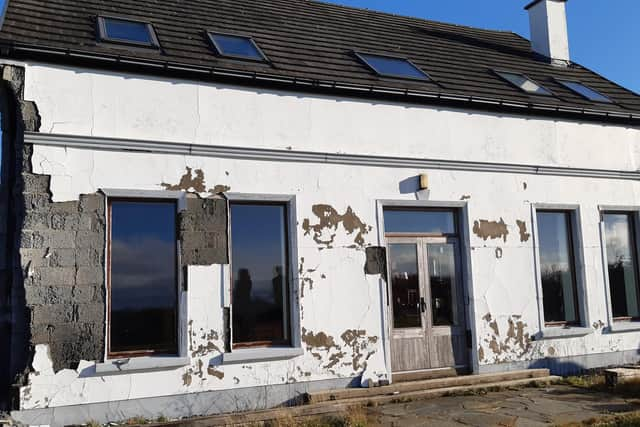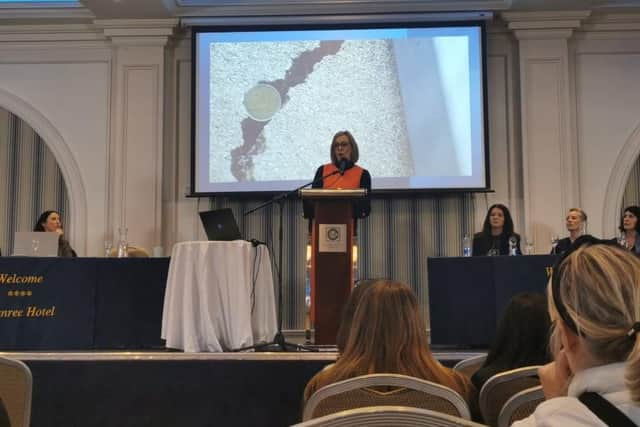Donegal students in MICA homes rejecting college due to family financial worries
and live on Freeview channel 276
Angeline Ruddy is a teacher at Moville Community College, a mother-of-three and her own home is also slated for demolition due to defective blocks.
She spoke at a conference in Letterkenny on Tuesday, which was attended by many international experts and which honed in on the science and societal impacts of defective blocks.
Advertisement
Hide AdAdvertisement
Hide AdAngeline told how the cracks in her home are in excess of 26mm wide and she does not know how much longer her family can live there.
She added however, that she is ‘not alone’ as 14 staff and over 150 students at the Moville school are in the same position.
Angeline outlined how the current scheme ‘requires so much money up front, that it is only for the financially well off’.
She told how, in the school, ‘everyone is talking about mica’ and guidance counsellors are providing mica counselling to ‘so many.’
Angelina said that trying to motivate students to a positive future is next to impossible’ as many are choosing not to go to college ‘in order to fix their family home’.


Advertisement
Hide AdAdvertisement
Hide AdStudents are also not choosing their preferred third level choice on what they want to study and where, but on finances and parents are using college savings to try and fix their family homes.
Angeline said that as home school community liaison, she has visited many homes ‘consumed by mica’ and has also met many families consumed by other challenges as well.
She told the conference how initial research from one of the schools’ ‘feeder’ primary schools indicates that 80% of their families live in homes affected by defective blocks.
She asked where accommodation for these families is going to be found and if it is acceptable that children and families are living in temporary accommodation such as converted sheds and mobile homes.


Some students, she added, are ‘studying for their Leaving Certificate in dreadful conditions;’ some in cramped mobile homes and one in a cabin ‘looking at a hole in the ground that was once his home’.
"Let’s face it, hundreds of students in Donegal are sleeping in mould ridden houses with drafts and are going to bed every night listening for cracking and falling masonry.”
She outlined how she has seen an increase in absenteeism due to stress and illnesses caused by sitting in cold and draughty rooms.
One student studies in her bed, as the house cannot be heated. A member of staff, along with her three siblings, all live in houses that need to be demolished.


Advertisement
Hide AdAdvertisement
Hide AdAnother person, she added, ‘spoke of their fears, as a piece of masonry skimmed past his son’s head while he was out cycling a tricycle in the summer’.
Parents, she told, are breaking down at parent/teacher meetings and one child has developed severe asthma ‘as a direct consequence of living in a damp, mouldy, mica house’.
Another student, said Angeline, ‘gets scared when he has to plug in a charger, as sometimes water comes out of the socket’.
"How can students receive an education with this all-consuming distraction going on around them?’
Angeline said the crisis is being exacerbated by the high level of deprivation in Donegal and asked how teachers can promote equality of opportunity as ‘inequality after inequality’ is ‘stacked’ upon the students. She told those gathered how this has led to ‘significant concerns’ for the ‘life chances’ of these students.
This crisis will continue to impact on students for the foreseeable future, said Angeline, but the school has not received any extra funding or support to ‘ensure equality of access to education.’
Advertisement
Hide AdAdvertisement
Hide Ad"The trail of destruction we see in schools is shocking and we have far from reached the epicentre of this humanitarian crisis. Our schools do not have the resources to cope with this.”
She continued: “We hear daily: ‘Miss, what is the point in me studying, it’s not like I can ask my parents to go to college? It’s just not an option. Some students are not accepting college places because they cannot add to families’ financial worries. Rebuilding the family home is the priority of families. Others are choosing courses not on preferences, but costing. Families have put their lives on hold for years and there is no end in sight.”
Angeline said that the voices of students ‘must be listened to’ and a plan put in place ‘before we lose some of our great minds.’